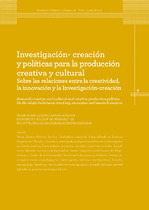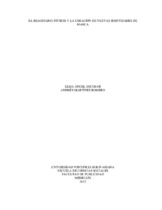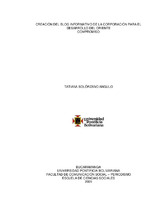| dc.contributor.author | Múnera Barrios, María Ginette | |
| dc.coverage.spatial | Seccional Medellín | spa |
| dc.date.accessioned | 2021-01-21T14:19:11Z | |
| dc.date.available | 2021-01-21T14:19:11Z | |
| dc.date.issued | 2016 | |
| dc.identifier.uri | http://hdl.handle.net/20.500.11912/7489 | |
| dc.description | p. 7 - 25 | spa |
| dc.description.abstract | La creatividad es un concepto excesivamente utilizado en los contextos académicos, especialmente en el discurso habitual de las disciplinas del hacer, como sucede con el arte, la arquitectura y el diseño. Si bien ser creativo es condición necesaria para que el diseñador-creador1 sea innovador, es incuestionable que la creatividad es potestad humana y no exclusiva de quienes se forman en estas disciplinas, puesto que todo ser humano es capaz de crear. Pese a que la creatividad se ha entendido por tradición como principio de novedad, es decir aquello que es novedoso o que «trae algo nuevo», es evidente que se aproxima de algún modo a la noción de «innovación» y de paso atraviesa el concepto de «investigación» a veces sin distinción. Sin embargo, esta reflexión no se detendrá en estas precisiones, pues el propósito principal de este escrito pretende esbozar de qué manera la creatividad es condición de posibilidad para que las disciplinas creativas logren encontrar apuestas conjuntas sin trazar límites. | spa |
| dc.description.abstract | Creativity is a concept excessively used in academic contexts, especially, in the everyday speech of the disciplines of making, as it happens with art, architecture and design. While being creative is a condition necessary for the designer-creator to be innovative, it is unquestionable that creativity is human agency and is not exclusive of those who are trained in these disciplines, since all human beings are capable of creating. Despite the fact that creativity is understood by tradition as a principle of novelty, i.e., what is new or «brings something new», it is obvious that it approximates in a way to the notion of ‘innovation’ and, incidentally, it crosses the concept of ‘research’, sometimes without distinction. However, this reflection will not stop in these details, since the main purpose of this paper is to outline how creativity is a condition of possibility for creative disciplines to find joint bets without tracing boundaries. | spa |
| dc.format.mimetype | application/pdf | |
| dc.language.iso | spa | |
| dc.publisher | Universidad Pontificia Bolivariana | spa |
| dc.relation.ispartof | Iconofacto | spa |
| dc.rights | Attribution-NonCommercial-NoDerivatives 4.0 International | * |
| dc.rights.uri | http://creativecommons.org/licenses/by-nc-nd/4.0/ | * |
| dc.subject | Creación | spa |
| dc.subject | Investigación-creación | spa |
| dc.subject | Políticas de creación | spa |
| dc.subject | Innovación e investigación | spa |
| dc.subject | Creation | spa |
| dc.subject | Research-creation | spa |
| dc.subject | Creation policies | spa |
| dc.subject | Innovation and research | spa |
| dc.title | Investigación- creación y políticas para la producción creativa y cultural Sobre las relaciones entre la creatividad, la innovación y la Investigación-creación | spa |
| dc.title.alternative | Research-creation and cultural and creative production policies. On the relatio’ns between creativity, innovation and research-creation | spa |
| dc.type | article | spa |
| dc.rights.accessRights | openAccess | spa |
| dc.type.hasVersion | publishedVersion | spa |
| dc.description.sectional | Medellín | spa |
| dc.identifier.instname | instname:Universidad Pontificia Bolivariana | spa |
| dc.identifier.reponame | reponame:Repositorio Institucional de la Universidad Pontificia Bolivariana | spa |
| dc.identifier.repourl | repourl:https://repository.unab.edu.co/ | |





